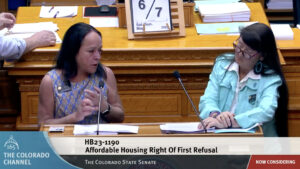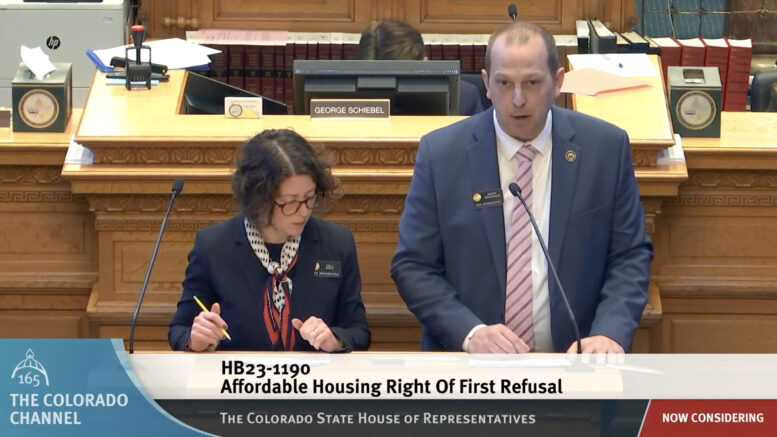Gov. Jared Polis on Tuesday vetoed a bill that would have allowed cities and counties to step into pending sales of older apartment complexes and use a right of first refusal to buy the property instead with a substantially identical offer, generating very strong reactions from both sponsors and opponents.
The Democratic governor’s veto of House Bill 1190 came two weeks after more than a dozen business and construction groups swarmed him with requests for such a move. Organizations from Colorado Concern to the Downtown Denver Partnership warned that the proposal could chill investment in multifamily real estate at a time when more such construction is desperately needed, and it was clear from Polis’ veto letter that he agreed.
HB 1190, which got its final approval on the last weekend of the 2023 legislative session, would have given local governments a right of first refusal on sales of apartment complexes at least 30 years old that contained a minimum of 15 units in urban areas and five in rural and resort towns. Cities and counties would have had seven days to declare their right, 21 days to make an offer and 60 days to close on it, though the time frame could have been extended if appraisals or financing were delayed through no fault of the governments.
The bill was one of a host of proposals this session to try to deal with the shrinking amount of affordable housing throughout the state, and it was touted by sponsors as a way for local governments to preserve existing below-market-rate housing by matching competitive offers. Supporters, who included government leaders in hot spots like Larimer and Summit counties, said affordable properties are being scooped up by out-of-state investments firms closing cash offers in a matter of days and then renovating the properties and raising rents, leading to displacement of everyone from service-industry workers to teachers.
Opposition surged to right of first refusal

Sen. Barbara Kirkmeyer spoke at length in opposition to the right-of-first-refusal bill during the closing days of the 2023 session.
But groups involved in the market, including the Colorado Apartment Association and Colorado Association of Home Builders, warned throughout the process that investors would look to put money elsewhere if forced to delay acquisitions three months or more while a government considers snatching away their offers. That in turn would slow new development, limit housing stock and drive up prices, resulting in a potential double blow of making already-pricey housing in the state less affordable while reducing property values and the taxes collected from them.
Polis, who focused his affordable-housing efforts this session on a failed bill to reform state land-use codes in order to spur more construction, expressed a significant number of concerns with HB 1190 in his veto letter. The bill could have created issues with banks and lenders in securing full title protection, contained ambiguous language around what “economically substantially identical” offers are and had a lack of clarity around when a notice of sale triggers the first-refusal timeline, he wrote.
“This uncertainty and ambiguity of the language could cause confusion between the local government and the seller, which could discourage investment at a time when the market cannot bear much risk,” Polis said. “I support local governments’ ability to buy these properties on the open market and preserve low-cost housing opportunities but am not supportive of a required right of refusal that adds costs and time to transactions.”
Business kudos
The veto brought praise from several of the groups that had sought such an action.
Colorado Concern noted that The CoStar Group had forecast a 3.23% cumulative decrease in the value of Colorado commercial real estate, equivalent to the loss of $1.57 billion in value, because of the unattractiveness of a market with such a unique law, and it lauded Polis’ move. And the Rocky Mountain Mechanical Contractors Association — part of the 17-organization coalition known as the Colorado Real Estate Alliance — emphasized that the veto showed the necessity to examine the details of potential policy and how such details, as was the case for HB 1190, could work against the stated goal of backers.

Dave Davia is CEO of the Rocky Mountain Mechanical Contractors Association.
“We understand the importance for finding solutions to address our attainable housing needs, but 1190 would have made things worse, not better for Coloradans,” RMMCA CEO Dave Davia said in an email to The Sum & Substance. “It’s time we find the right solution that strikes an important balance for the commercial building industry that is at a tipping point, given higher interest rates and uncertainty as we experience this new post-Covid normal of higher vacancy rates as more workers are working from home.”
Sponsors’ rebuke
But the sponsors of the bill — Democratic Reps. Andy Boesenecker of Fort Collins and Emily Sirota of Denver and Democratic Sens. Faith Winter of Westminster and Sonya Jaquez Lewis of Longmont — were unflinching in their criticism of Polis’ decision. And they noted in a letter signed by all four that in a session that was supposed to be focused on affordable housing, Polis failed to pass his signature bill or go to bat for anti-displacement policies killed in the Senate, including proposals to allow local governments to implement rent-control laws and to require just cause for tenant evictions.
The foursome argued that Polis came under the influence of several groups that did not participate in the negotiations that led to some big changes in the bill, including shortening of timelines for consideration and the exemption of any property under 30 years of age. They accused Polis of engaging in “backroom negotiations” and “last-minute veto letters,” charging him with not responding to local governments that reached out asking him to sign HB 1190.
The also called it “alarming” that the governor’s office not only got its requested changes on timelines, a waiver process and unit thresholds in the bill but was helping sponsors count votes on the bill as late as the last week of the session.

Colorado state Sens. Faith Winter and Sonya Jaquez Lewis explain House Bill 1190 to the Senate on May 6.
“Our coalition was assured on numerous occasions that a veto was not being contemplated — until it was once the corporate lobby went to work,” the four legislators wrote. “While it was our bill, alongside a coalition of supporters, that was vetoed today, it is the residents of Colorado who continue to lose when they can least afford to do so, due to a lack of cohesive affordable housing policy that is insulated from the interests of private equity, powerful lobbyists and large corporations.”
Options to right of first refusal
Polis in his veto letter also said that he was “deeply disappointed that some stakeholders chose not to engage with the General Assembly and instead only brought their concerns to me after the end of the legislative session.” But he said that did not invalidate the serious policy and technical issues with the bill and added that he would prefer policies such as new financial mechanisms for cities seeking to buy apartments or required notices of sale that don’t come with transaction-impeding rights of first refusal.
As Polis vetoed HB 1190 on the next-to-last day of the 30-day period that he has to sign or veto bills from the 2023 session, he also signed two laws adding tenant protections. Senate Bill 184 limits the amount of deposit that landlords may require and the minimum salary they can demand that prospective tenants make, and HB 1120 requires mediation before landlords can evict tenants on public assistance.
However, in signing statements accompanying both bills, Polis noted that he is leery that the new restrictions could lead to higher rents and greater unaffordability. And he said that he would oppose future legislation that could have the unintended consequence of decreasing the supply of affordable rental housing.
